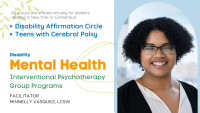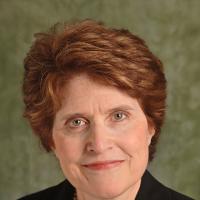
Mental Health Services
Providers Trained in Neurodevelopmental Disorders
When physical health is affected by cerebral palsy, the corresponding effects on one’s mental health may be overlooked. Early recognition and diagnosis of mental health disorders in people with cerebral palsy can help improve outcomes. At the CP Center, our mental health professionals have clinical expertise in neurodevelopmental disorders to provide assessment, diagnosis, and treatment options for you. We offer a fully featured mental health program with psychotherapy and psychiatry, and will work collaboratively with you and your care team, for the most suitable intervention to care for your physical wellbeing as well as your mental health.
Licensed Clinical Social Worker Minnelly Vasquez, LCSW works collaboratively with patients and their families to create a mental health treatment plans. She provides evidence-based care including therapy and support group offerings to individuals and groups.
Psychiatrist Agnes Whitaker, MD has over 20 years of clinical expertise in the mental health care of individuals with neurodevelopmental disorders, including treatment of co-occurring mood, anxiety, psychotic disorders. Dr. Whitaker provides psychiatry evaluations, consultations and medical interventions to complement the offerings from Minnelly Vasquez, LCSW.
Getting Started
To begin mental health services at the Weinberg Family Cerebral Palsy Center, patients first complete a comprehensive mental health evaluation to help determine their individual needs. Based on this assessment, you may be referred to psychotherapy, psychiatry, or a combination of both, with ongoing monitoring by our care team. For adults seeking mental health services, we strongly recommend an appointment with our family nurse practitioner to support continued coordination and follow-up. This integrated approach reflects our understanding that mental and physical health are deeply connected, especially for people living with cerebral palsy.
The comprehensive mental health evaluation is conducted in person, while psychotherapy and follow-ups may be offered via telehealth. Regular in-person check-ins may also be required.
Treatment Options
Psychotherapy (Individual, Couples, Family)
Psychotherapy, or talk therapy, is a way to get out thoughts and feelings to a non-biased third party. At the Weinberg Family Cerebral Palsy Center, individual psychotherapy sessions are available for young adults and adults with cerebral palsy and for their caregivers. It may be used in combination with medications or other treatments, or it may be provided independent of other interventions. Psychotherapy is an evidence-based treatment to address mental health conditions, including depression, anxiety disorders, insomnia. At the same time, psychotherapy can help people with CP and their caregivers deal with other issues such as stress, trauma, and relationships.
Interventional Psychotherapy Groups
Facilitated by Licensed Clinical Social Worker Minnelly Vasquez, LCSW, our groups are offered virtually for patients residing in New York or Connecticut. More on our current groups can be found here or below. For enrollment, please contact cpcenter@cumc.columbia.edu or 212-305-2700.
Disability Affirmation Circle - Spring 2026 : Thursdays 6-7pm from 2/19/2026 to 5/28/2026 (no session on 3/5/2026 and 4/16/2026)
Thursday 6pm-7pm | Limited to 12 participants
Location: Virtual Platform
This group offers a space to explore and affirm disability identity through shared discussion, reflection, and learning. Each week, we will engage with materials such as articles, podcasts, or films centered on the lived experiences of people with disabilities. Topics will include key moments in disability history, from periods of injustice and resistance to milestones of progress and ongoing advocacy. Together, we’ll process the emotional, social, and personal dimensions of disability and build community through collective affirmation and dialogue.
Interventional Psychotherapy Group for Teens with CP - Spring 2026 : Two Tuesdays per month after first meeting on Monday 1/19/2026. Group ends on 6/2/2026
Tuesdays | 5:45 PM – 6:45 PM | Limited to 10 participants
Location: Virtual Platform
This group offers a safe and welcoming space for teenagers with cerebral palsy to connect, share experiences, and support one another. Through open conversations, fun activities, and peer connection, teens will have the opportunity to build friendships, explore identity, and talk about the challenges and strengths that come with living with CP.
Psychiatry
Some of us may need more help in coping with mental health challenges. Medication can help treat co-occurring mood, anxiety, and psychotic disorders, but can be complicated by the complexities of other comorbidities and existing medications used to manage your cerebral palsy. Our care team and mental health team aim to establish a helpful relationship with you, to understand how your mental health intersects with cerebral palsy and other related health conditions and interventions.
The first step to psychiatry is a comprehensive evaluation Agnes Whitaker, MD, a psychiatrist with over 20 years of clinical expertise in the mental health care of people with neurodevelopmental disorders. Dr. Whitaker will assess and suggest treatment options for accompanying comorbid conditions. If medication is indicated, close monitoring and management is needed. Some medication used in psychiatry may cause motor side effects if you have CP, that is why it is important for our team to work closely with you to monitor and investigate not only progress but also symptoms. Medication management involves close monitoring for side effects, interactions with existing medication, and adjusted medication titrations.
If you are already on medication for mental health we are also available for consultations to support you.
Telehealth
Our mental health services can be offered via Telehealth for those who cannot travel or prefer a virtual visit.
Link to other mental health resources









